Executive Summary
Executive. Scott O'Neil. Industry. Sports and Entertainment. Key. O'Neil shares his methods to succeeding in sports and business management.
Scott O'Neil views failure as temporary — you can take a chance and learn from it.
That attitude has worked well for O'Neil during his sports and business management career. He's worked for the NBA and the Philadelphia Eagles, and he's currently the CEO of the Philadelphia 76ers in the NBA and the New Jersey Devils in the NHL. He also runs the Prudential Center in Newark, N.J., a multi-purpose arena where the Devils play home games. (Billionaire private equity investor Josh Harris owns both teams.)
Beyond the temporary nature of failure, O'Neil is a big proponent of always looking ahead in business. That's why he hosts an annual event called Go Forward. “We call it 'Go Forward' as opposed to a retreat because if you think of the word retreat, it means you're going backward,” O'Neil says.
At Go Forward, O'Neil and about 100 leaders from the Philadelphia and New Jersey sports franchises get together for two days to engage in team building, communication and other managerial and leadership exercises. “It's really about escaping from the noise of work or home for a couple days to make sure we have a chance to reset and get ready for the next offseason, which is the summer,” O'Neil says.
The 'Go Forward' event is one of several examples of O'Neil's executive strategies and methods. O'Neil recently spoke at the USF Sport and Entertainment Management M.B.A. lecture series held on the main campus in Tampa. He also sat down with the Business Observer to talk about his career. Here are edited excerpts of the interview:
What are the characteristics that make a successful leader?
The characteristics I've seen in great leaders are being someone who can attract and develop world-class talent, has high integrity, has a strategic planning mind and focus, is a good communicator and has an authentic way about them.
How can an executive develop those skills?
What I've seen in my life and career is that there are different teachers. One is just experience. Sometimes you just have to walk across the coals. You actually have to go through the fire. There's just value in experience, and I think that's a great teacher.
Secondly, I'd say being around great leaders and great teachers is quite an asset. Sometimes it's accidental and sometimes you purposely self-select your way in, but I think the opportunity to be around people who lead at a high level, there's certainly some osmosis that rubs off on you. And the third thing I'd say is the best leaders show their stripes when they're needed most. So if I were a young leader and evolving and developing, I'd look for those opportunities to truly lead in a time when people need it.
How do you approach tough decisions? Do you go with your gut feeling or use specific data?
I believe that in this day and age, we have access to more data than we've ever had in our history. But if you make decisions just by data, I think you're going to be wrong quite a bit. And if you make decisions just by your gut, I think you'll have an equal amount of success. The magic comes when you marry the art and science. When you can effectively marry those two, that's when it's most likely to be a good outcome.
What's a decision you've made that has been doubted?
Every day people doubt a decision I make. I would say, of the bigger ones, leaving the Philadelphia Eagles to start hoopstv.com, an Internet company that subsequently went bust.
So, you could either say that was the worst decision you could make, leaving a preeminent brand at a time where we were just about to build a new stadium and the team was turning into a great organization. But I would say, boy what a chance. It was the first time I got to run a business and raise money and experience that. I had six partners that are dear friends that are spattered all over the sports and entertainment business that I still stay in touch with and do work with. I think sometimes in life and work, you have to make the leap.
How do you justify to yourself that a new endeavor is going to improve?
You've got one run through life, and you want to have as wide a range and fun set of experiences as you can possibly have. I've had some incredible jobs. Fun brands, incredible opportunities with amazing people. And at the end of the day, I never seem to look back. I always try to look forward and enjoy the moment of what I'm doing. I never try to justify what I do. I mean I guess I have to to my wife, but other than my wife and I, you have to make decisions that are best for you. It usually works out the way you decide it works out, even if it's not the way you intended. Like I didn't intend on hoopstv going belly up, but from there I got to the NBA. I would've never gone to the NBA league office if that hadn't happened.
What lessons did you learn from going on your own for the first time?
I had all these experiences throughout my career of places that were the opposite of where I wanted to work. So I knew that when I had an opportunity, I was going to create a great place to work. My biggest lesson was that that's great, but if you don't have a business, it's not sustainable and it doesn't matter.
How do you approach failure and mistakes?
I never run from failure. I think of Thomas Edison. They asked him about the light bulb and they were kind of making fun of him because he had gone through more than 10,000 iterations to create it. And he said he didn't fail 10,000 times; he just learned what didn't work. There is some aspect of learning that is really intriguing to me that in order to learn, you have to keep pushing. I'm not sure anything great can ever be accomplished without pushing the envelope. But failure is probably a strong word. Falling is different than failing. Falling is when you pop up, and I think there is more falling than failing. Like hoopstv, that's a failure. But most of the time, you just fall down and pop back up. I never sweat that stuff. I've got plenty more of those to come.
How would you describe the biggest challenges of running a sports team/business?
There are always way too many things than we can possibly tackle. The list is always too long. So with that as the backdrop, I want to make sure we figure out what's important and focus on it.
And secondly, I have to spend enough of my time leading and making sure people are inspired to work where they work. I want this to be a place that you'd never leave or you'd tell your best friend to come to work. It's all a work in progress. You don't snap your fingers, walk into a place and that's what it becomes. You build it piece-by-piece and block-by-block.
What is the one business lesson that's resonated with you and helped propel you to where you are?
Boy I have so many. I've made so many mistakes. That's where I get most of my lessons. I would say above all, at the end of the day, you have your integrity, your reputation and your friends. You have to figure out how to make sure none of those are ever compromised.
Lead by example
Scott O'Neil, CEO of the Philadelphia 76ers and the New Jersey Devils, has had multiple role models in his career. Six standouts include:
John Spoelstra, former president of the New Jersey/Brooklyn Nets: “He took stock in young people. It was the first time I saw a real culture come together, and he believed in us so much more than we believed in ourselves.”
Len Komoroski, CEO of the Cleveland Cavaliers: “He's a brilliant strategic planner. Brilliant.”
Joe Banner, former CEO of the Philadelphia Eagles and Cleveland Browns: “He taught me more about the investment you need to make in the community and how important it is to not only make a difference when you can to leverage your brand, but also the impact it has on staff.”
Adam Silver, NBA commissioner: “Boy, I learned most of what I know now from him. I would say from him, in a nutshell, talent, talent, talent. So bet on people and bet on talent.”
David Stern, former NBA commissioner: “Do the work up front. Put the work in, do the research, never stop learning and make sure you're prepared.”
Seth Berger, founder of And1: “He taught me that in any business, there are only three things that really matter. You have to figure out what those are and spend 80% of your time focusing on those three things.”






